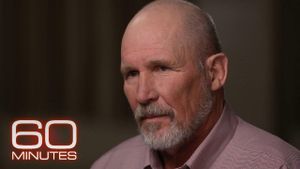On Wednesday, Russia's Foreign Ministry made headlines by announcing the expulsion of two German journalists from the ARD national broadcaster. This drastic action was characterized as retaliation against Germany for its perceived hostile actions toward two Russian journalists working for Channel One, the state-controlled media outlet. The diplomatic row has stirred renewed tensions between Germany and Russia, echoing the broader fallout from the conflict surrounding Ukraine.
Maria Zakharova, spokesperson for the Russian Foreign Ministry, stated at a news briefing, "We are compelled to take reciprocal measures against journalists working for the Moscow office of the German ARD media group." Zakharova added, "This is in response to the German authorities' ban on the stay and work of Channel One correspondents," underscoring the cyclical nature of sanctions and retaliations within international media freedoms.
The journalists facing expulsion are correspondent Frank Aischmann and cameraman Sven Feller. They have been instructed to relinquish their media accreditations and leave Russia by December 16. ARD, the German broadcaster involved, expressed concern and stated it did not receive official confirmation of the expulsion until it was reported by various media outlets. They labeled this development as "a new low point" for relations between Germany and Russia and highlighted increasing pressure on Western journalists since Russia's military actions began.
Meanwhile, the German government denies having taken any steps to shut down Channel One's operations within its borders. Christian Wagner, spokesperson for Germany's Foreign Ministry, strongly refuted claims from Channel One. He emphasized, "The federal government has not closed the office of this broadcaster." He pointed out, "Russian journalists can report freely and unhindered in Germany," trying to clarify the legal problems surrounding the residency status of the Russian journalists caught up in this exchange.
The German authorities did, nonetheless, refuse residency permits for Channel One’s head and cameraman last Friday, claiming this was based on national security interests. This decision could be appealed, but it has already raised questions about the degree of acceptable press freedom amid growing geopolitical tensions.
Currently, Channel One is under sanctions from the European Union, which prohibits its broadcasting within member states, largely due to allegations of disseminated disinformation supporting Russia’s military actions, particularly concerning the Ukraine conflict. This has created a fraught environment for Russian media personnel operating abroad.
Wagner attributed the difficulties faced by Russian journalists to independent decisions made at the state level, stating, "Residence law falls under the jurisdiction of the regional states, which act independently of the federal government." This nuance revealed the complexity of media relations and the underlying struggles of journalists attempting to navigate these politically fraught waters.
The retaliation reflects more than just personal attacks on journalists; it signifies the larger geopolitical struggle between Russia and the West, particularly Germany, as both countries navigate the repercussions of their media's involvement and representation of the war in Ukraine. The tensions spark questions about freedom of speech and the rights of foreign correspondents, raising red flags about the state of press freedom not only within Russia and Germany but more broadly across Europe.
Zakharova explicitly linked the measure to Germany's actions against Channel One, implying these moves are retaliatory rather than judicial, which complicates the dialogue surrounding media freedoms and rights against national security concerns. At the same time, she indicated Russia's openness to possibly reissuing media credentials for new ARD staff should Germany permit work for Channel One's journalists in Berlin, reinforcing the idea of reciprocal treatment between nations.
This episode is just one recent example of the increasing clampdown on journalism within and around Russia. Instances of foreign journalists facing bans, abstract accusations, and arbitrary expulsions continue to make headlines, creating apprehension among those holding the journalistic profession. With each tit-for-tat expulsion, the space for objective reporting shrinks, leaving journalists and media organizations grappling with the ever-shifting sands of international relations.
Throughout the past year and more, journalist safety has been under constant threat, leading to discussions both within media hierarchies and among independent observers about how to protect those who report from hostile environments. The outcome of these tensions will likely hinge not just on individual cases but on the broader geopolitical currents reshaping Europe.
Importantly, this story also sheds light on regulatory frameworks each country employs to battle what they perceive as propaganda—both Germany and Russia cite national interests as justification for their respective strategies against foreign journalists.
Indeed, as the dispute over journalistic integrity escalates, the underlying clash between democratic ideals and absolutist claims of state control becomes apparent. This dynamic is playing out not only between Germany and Russia but also across various regions impacted by political censorship and state-sponsored narratives. The future of press freedom appears precarious as each nation navigates its defensive protocols against the perceived threats of misinformation and external influence.
Looking forward, it’s clear both countries must navigate these complex issues carefully. The continued expulsion of journalists under various pretexts—whether based on residence status or broader suspicions—deepens divides and raises concerns over freedom of expression. The public's right to know can come under fire when media personnel are caught between geopolitical conflicts, leaving the integrity of reported truths vulnerable to the shifts and changes enforced by state policies.



